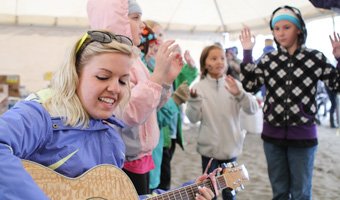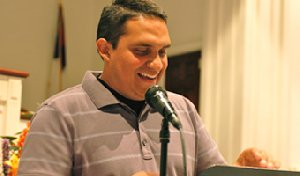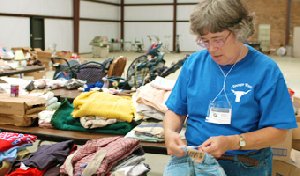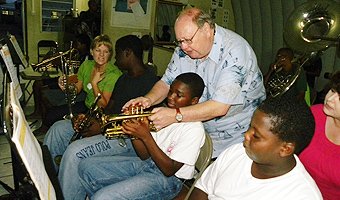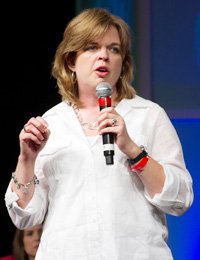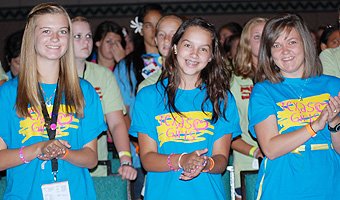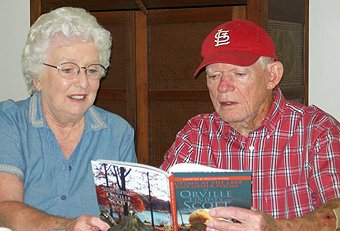Around the State
• Dillon International will hold a free adoption meeting at 6 p.m. Sept. 12 at the Buckner Children's Home campus in Dallas. A Dillon representative will give an overview of adoption from China, Korea, Haiti, India and Hong Kong, plus new opportunities in Ghana. A domestic adoption program for Texas families and adoption programs in Russia, Ethiopia and Honduras—available through an affiliation with Buckner International—also will be discussed. For information or a reservation, call (214) 319-3426.
|
Preteens from four states—Texas, Oklahoma, Missouri and Arkansas—joined together for an evangelistic effort in North Little Rock, Ark. The 125 preteens worked with 445 children and youth in the Jacksonville Boys' and Girls' Club and in apartment complexes around the city. After eight months of preparation, they taught Bible lessons, led worship, taught memory verses and counseled children for salvation. One hundred eighty-three children, youth and adults were led to Christ during the endeavor. Participating Texas churches were First Church in Granbury, Wedgwood Church in Fort Worth, Retta Church in Burleson and Hillcrest Church in Cedar Hill.
|
• Hardin-Simmons University will hold a conference to celebrate the 400th anniversary of the King James Version of the Bible Sept. 12-13. "The conference will focus on the world of the King James Version in the context from which it arose and its creation. We will focus on its influence on culture and the church," said Bob Ellis, associate dean for academics at Logsdon Seminary. The Bible collection at HSU, which includes many rare editions, also will be on display. To register for the conference and make reservations for the complimentary meals, visit Logsdon Seminary's website at www.logsdonseminary.org, or call (325) 670-1587.
• The Center for Christianity in Business at Houston Baptist University will hold a networking luncheon for business professionals Sept. 30 at noon. The topic will be "Work/Life Balance: How Shall a Christian Professional Then Live?" Tickets are $25 if purchased by Sept. 15, and seating is limited. For more information or to purchase tickets, go to www.hbu.edu/worklifebalance.
• Dallas Baptist University conferred 195 degrees during its August commencement ceremony. Graduates received 99 bachelor's degrees and 96 master's degrees. Jerry Carlisle, pastor of First Church in Plano, received an honorary doctor of divinity degree.
• Baptist University of the Américas celebrated "Mary Ranjel Day" Aug. 16 in recognition of 35 years of service to the school. She began as a file clerk and has risen to be the first female member of the school's executive council as director of enrollment and student services. Surprised by the proclamation during an assembly for new students, she was doubly surprised when her children and grandchildren entered the chapel bearing flowers. A reception followed that afternoon.
• Nine faculty members have been added at Howard Payne University. New to the school are Danny Brunette-Lopez, Spanish; Elisabeth Greene, music; Samuel Greene, political science; Derek Hatch, Christian studies; Amy Kresta, biology; Paul Lilly, criminal justice; Mickey Sargent, mathematics; Melissa Switzer, social work; and Mike Terrill, athletic training.
• The Commission on Accreditation of Athletic Training Education has awarded the athletic training program at East Texas Baptist University a 10-year accreditation certificate. This is the highest award that is given by the commission. ETBU has 28 students currently enrolled in the program. The program is expecting 40 new students for the fall semester.
Anniversaries
• Dave Wilkerson, fifth, as pastor of Ranchhouse Cowboy?Church in Maypearl, Aug. 4.
• Dale Gore, 60th in ministry, Aug. 5. He has been pastor of Elm Grove Church in Belton 12 years. Previous pastorates include Baggett Creek Church in Comanche County, First Church in Whitewright, First Church in Goldthwaite, Trinity Church in Sherman and First Church in Denison. He also served First churches in Uvalde, Hillsboro and Brownwood as minister of music. He was director of missions for Grayson and Austin associations.
• Corky Holland, 10th, as minister of senior adults and pastoral care at First Church in Amarillo, Aug. 14.
• Blain Craig, fifth, as pastor of Oak Crest Church in Midlothian, Aug. 20.
• Bruce Smilie, fifth, as pastor of Crosspointe Church in Midlothian, Aug. 20.
• Ron Lyles, 30th, as pastor of South Main Church in Pasadena, Aug. 21.
• Michael Dean, 20th, as pastor of Travis Avenue Church in Fort Worth, Sept. 1.
Deaths
• Johnie Mae Sasse, 99, July 6 in Baytown. Her late husband, Brooks Sasse, was pastor of churches in Mount Calm, Florence, Livingston and Baytown during their 43-year marriage. She was a member of First Church in Baytown more than 50 years. She is survived by her daughters, Naomi and Chrissy Sasse.
• James Harrell, 85, July 9 in Ridgeland, Miss. His ministry encompassed more than 60 years. He was a pastor, associational director of missions, staff member of the Mississippi Baptist Convention, and served on the stewardship staff of the Baptist General Convention of Texas 14 years. He also was awarded the Bronze Star as an Army infantryman in the Battle of the Bulge. He was preceded in death by his first wife, Elizabeth; brothers, Redus, Jack and Charles; and sisters, Eleanor Pennington, Elizabeth Harper and Elsie Hughes. He is survived by his wife, Carolyn; daughter, Grace Hopkins; sons, David, Mark and Philip; sister, Peggy Spencer; brother, Benny; eight grandchildren; and two great-grandchildren.
• Bill Merritt, 85, July 25 in Georgetown. A graduate of Howard Payne University and Southwestern Seminary, he ministered to Baptist churches 64 years. While at HPU, he was pastor of Nix Church in Lampasas County and Naruna Church in Burnet County. He also was pastor of Alexander Church in Erath County, Lake Victor Church in Burnet County, and he served First Church in Bertram while attending seminary. Following graduation, he was pastor of First churches in Jacksboro, Coleman and Denver City. After retirement, he became pastor of Grosvenor Church in Brownwood, where he served another 20 years. He served on the Executive Board of the Baptist General Convention of Texas 18 years and as a trustee of Baptist Memorials Ministries in San Angelo nine years. His records show he baptized 731 people, married 258 couples, conducted 535 funerals and led 45 revivals. He was a member of Crestview Church in Georgetown at the time of his death. He was preceded in death by his brothers, Wayne and Loy; and sister, Faye Swearingen. He is survived by his wife of 67 years, LaDelle; daughter, Karen Jackson; sister, Bobbie Crosby; two grandsons; and six great-grandchildren.
• Bobbie Murray, 78, Aug. 9 in Cedar Hill. She attended Mary Hardin-Baylor College and sang in the choral group there. She was an administrative assistant for the ministers' counseling service of the Baptist General Convention of Texas 16 years, retiring from that position in 1999. She was a member of Hillcrest Church in Cedar Hill. She was preceded in death by her first husband, Don Anthony; son, Paul Murray; and brother, Jim Thorn. She is survived by her husband, John; daughter, Susan Gobert; sons, Steve Anthony and John Murray Jr.; sisters, Nell Lewis and Jeanne Winters; brother, Joe Thorn; and nine granchildren.
• Cecil Ray, 88, Aug. 23 in Georgetown. He was born on Seminary Hill in Fort Worth. He was a graduate of Howard Payne University and Southwestern Seminary. He was ordained as a minister of the gospel in 1940 at Immanuel Church in San Angelo.
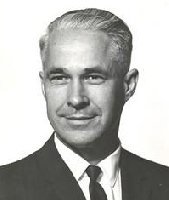
Cecil Ray
|
He was pastor at Bennet Church in Llano, Rowena Church in Rowena, Alexander Church in Dublin and Risen Star Church in Sulphur Springs before starting Arnett-Benson Church in Lubbock. In 1956, he resigned from the Lubbock church to become superintendent for missions for San Antonio Association. In 1961, he joined the staff of the Baptist General Convention of Texas, serving as secretary of the Cooperative Program. He later was promoted to director of the stewardship division, and he wrote numerous training materials to assist Texas Baptist churches with their financial stewardship and planning. In 1976, he became the general secretary-treasurer of the Baptist State Convention of North Carolina, where he served until 1983. He then became national director of Planned Growth in Giving, serving on the Executive Committee of the Southern Baptist Convention. Upon retirement at the end of 1988, he moved to Georgetown and taught Sunday school at Crestview Church there until 2004. He was the author of several books, including Living the Responsible Life. He was preceded in death by his wife, Charlene; daughter, Susan Ray; brothers, Truett, Junius, Jessie, Woodie and Henry; and sisters, Mary Ruth Cervenka and Margaret Ray. He is survived by his son, Lanny; sister, Beth Hunsinger; two grandchildren; and one great-granddaughter.
Event
• First Church in Breckenridge honored Cecil Langford, Aug. 21. Born Aug. 24, 1911, he continues to serve as an active deacon, is a member of the Singing Senior Choir, and he and his wife, Nell, provide offertory music on the fiddle and piano regularly.
Ordained
• Ken Barnes, Jeremy Kollaus and Matt Wall as deacons at First Church in La Grange.



